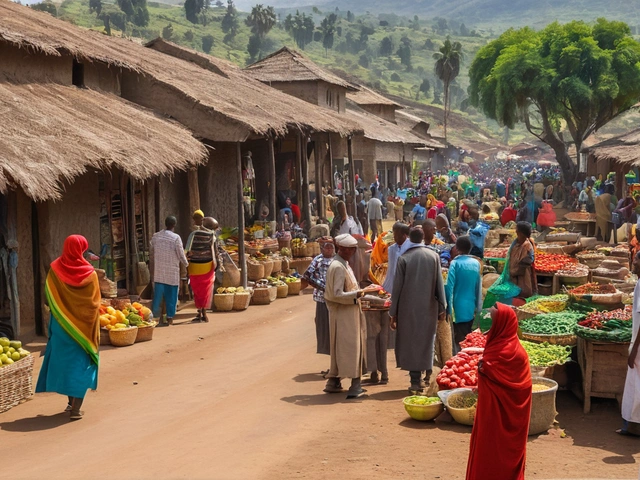When thinking about kicking off a new business, the cost of setup is a crucial factor. Sub-Saharan Africa, known for its dynamic market environments, also offers some of the most cost-effective opportunities for entrepreneurs. This read delves into nations within this vibrant continent that stand out as the ideal spots for economic ventures, with a particular focus on affordability in the business initiation phase.
- Business Climate Overview
- Top 5 Affordable African Countries
- Regulatory Considerations
- Cultural Influence on Business
- Long-term Financial Considerations
- Entrepreneurial Support Systems
Business Climate Overview
The stage of economic development and regulatory environment of a country plays a significant role in determining its business climate. In Africa, the business landscape varies widely, influenced by historical, geographic, and political factors. Some countries boast a bustling startup scene, backed by progressive policies and a growing middle class, while others present more challenging conditions due to political instability and economic fluctuations.
For anyone considering starting a business in Africa, understanding the nuanced economic landscapes is crucial. Economies like Rwanda and Mauritius have been lauded for their reformative approaches, making significant strides in easing business operations. Conversely, countries with larger economies, such as Nigeria and South Africa, while offering vast market potential, often come with more complex regulatory hurdles and competitive environments.
Key to any business decision is the ease of doing business index, a valuable tool for gauging the administrative efficiency and regulatory environment. For instance, Rwanda has consistently climbed this index due to governmental efforts to enhance transparency and streamline business procedures. The case of Rwanda illustrates how regulatory reforms and government incentives can dramatically improve the business climate, encouraging domestic and international investment.
Yet, the African business climate is not just shaped by economic and regulatory factors but also by socio-cultural dynamics. These can influence everything from consumer behavior to how negotiations are conducted. Understanding these cultural nuances is essential for anyone looking to embark on a business venture in Africa. As the continent continues to grow economically, keeping abreast of these changes and the opportunities they create is vital for success.
Top 5 Affordable African Countries
In the quest to identify where in Africa you can start a business without breaking the bank, several countries come to the forefront due to their low entry barriers and business-friendly policies. Among these, five stand out not only for their affordability but also for the supportive environment they offer to entrepreneurs. This exploration dives deep into the characteristics that make these nations the top picks for cost-conscious business starters.
Rwanda
Rwanda ranks impressively due to its government's commitment to fostering an environment conducive to business. In recent years, the country has remarkably improved its business registration processes, making it faster and simpler. For example, registering a business in Rwanda can now be done within a few days and does not require a paid-up capital, which significantly lowers the barrier for new entrants. The government also offers various incentives for startups, including tax breaks and investment credits, making it an attractive destination for entrepreneurs looking for a cost-effective place to start their ventures.
Botswana
Botswana is another standout country, known for its stable political environment and robust legal system, which are crucial for business confidence. The ease of doing business here is enhanced by effective regulatory reforms and considerable government support in terms of financial grants and mentoring programs for startups. Botswana's strategic position as a gateway to Southern Africa also makes it an ideal location for businesses looking to tap into the regional market.
Zambia
Zambia offers a dynamic marketplace with growing opportunities in various sectors such as agriculture, manufacturing, and services. The Zambian government facilitates a straightforward business registration process and its taxation policy is favorable for small to medium enterprises. Especially compelling is the country's access to regional markets through its membership in the Common Market for Eastern and Southern Africa (COMESA), enhancing its appeal to entrepreneurs who have a vision to expand regionally.
Ghana
Ghana is celebrated not only for its democratic governance but also for its vibrant economic policies. The country has been active in implementing reforms that simplify the starting and operating of businesses, like eliminating bureaucratic red tape and improving the legal framework for businesses. A significant advantage for new businesses in Ghana is the relative ease of access to credit and business support services provided by both government and private entities, which reduces startup costs significantly.
Senegal
Finally, Senegal, with its strategic location on the west coast of Africa, offers excellent opportunities for businesses, particularly in trade and export-oriented industries. The Senegalese government has made significant strides in improving the business climate by streamlining the process of business registration and reducing the cost of starting a business. This vibrant country is rapidly becoming a hub for entrepreneurship in West Africa, supported by both local and international investors attracted by its potential.
Regulatory Considerations
Understanding the regulatory landscape is paramount when venturing into a new business domain, especially in a diverse and multifaceted continent like Africa. Each country has its own set of rules and requirements that can significantly influence both the ease of starting a business and the long-term sustainability of your venture. These regulations cover a broad spectrum, from business registration processes and tax compliance to labor laws and environmental regulations.
In a country like Rwanda, which has been widely praised for its business-friendly environment, the government has implemented straightforward procedures for business registration that can be completed in just a few days. This ease of setup is not just about reducing paperwork, but also about creating an inviting atmosphere for foreign investors and local entrepreneurs alike. The transparency and efficiency in dealing with government agencies is a breath of fresh air for anyone looking to start a business.
Contrastingly, in some other African nations, the regulatory environment may be more cumbersome, involving multiple steps and potentially confusing requirements that can deter potential business owners. In Nigeria, for example, the process involves several stages of verification and multiple government bodies, which can extend the time and cost of setting up a business. It’s important for entrepreneurs to engage local legal counsel or consult business facilitation services that can navigate these waters smoothly.
An often overlooked but critical aspect of regulatory considerations is the compliance with local cultural norms and practices. In many African countries, understanding and integrating into the local culture can provide a smoother path through regulatory processes. For instance, in Ethiopia, building relationships with local authorities and understanding the informal codes of conduct can enhance business operations and facilitate easier regulatory compliance.
Furthermore, technological advancements have influenced regulatory processes across Africa. Some countries are adopting digital platforms to streamline business registration and tax filing, which significantly cuts down on the time and confusion associated with bureaucratic procedures. Kenya, for instance, offers an online portal for business registration which simplifies the entire process, making it easier for entrepreneurs to focus on other aspects of setting up their operations.
Even as countries differ in their specific regulations, a common thread among more successful environments is the drive towards reducing corruption and enhancing transparency. This commitment not only attracts business but also contributes to creating a stable environment that nurtures long-term growth. For businesses looking to penetrate African markets, understanding these regulatory frameworks and choosing wisely where to establish operations can make all the difference in achieving success.
Cultural Influence on Business
The cultural landscape of a country deeply influences how business operations are conducted within its borders. In Africa, where a rich tapestry of cultures thrives, understanding these cultural nuances is not just beneficial but essential for business success. For instance, business practices in Kenya are heavily influenced by community and familial ties, which can play a pivotal role in networking and building business relationships. This is a stark contrast to more individualistic approaches seen in Western cultures. Owning a business here means understanding and respecting these societal norms and ethics.
Another aspect to consider is the communication style. African countries often pride themselves on politeness and indirect communication. In Nigeria, for example, direct confrontation is avoided in business dealings, which can sometimes be misinterpreted by outsiders as evasiveness. Understanding such nuances can prevent potential misunderstandings and pave the way for smoother interactions. Effective communication, grounded in the cultural context of the country, is crucial to fostering strong business relationships.
Moreover, negotiation styles also differ. In many African societies, business negotiations are not just transactions but a form of relationship-building. Here, patience and personal engagement are often emphasized over quick deals. This approach can sometimes extend the negotiation phase but ultimately leads to more sustainable business partnerships. Countries like Ghana exemplify this, where taking time to know one's business partners is seen as essential, reflecting a broader cultural emphasis on community and mutual respect.
It's also important to recognize the role of cultural celebrations and public holidays which can affect business operations. Many African countries have rich calendars of cultural festivities which may influence business hours or operations. Being aware of these and planning accordingly can show respect and understanding for the local culture, and also assist in planning business activities efficiently around these dates.
Lastly, adapting business models to fit local tastes and preferences is critical. For instance, mobile technology adoption in Africa is incredibly high, influencing sectors like banking, retail, and services. Businesses that recognize and adapt to this digital preference tend to perform better. This adaptability should also extend to other sectors, understanding that each region might have specific needs and preferences that differ markedly from global or Western standards.
Long-term Financial Considerations
Embarking on a business venture in Africa is more than just handling the startup phase costs; it involves delving into the ongoing financial commitments that could shape your company's future. One must consider not only the apparent expenses like rent and wages but also subtler, yet significant costs such as local taxes, utility expenses, and compliance with regulatory changes. These aspects determine long-term financial health and sustainability in a dynamic economic landscape. Countries with stable economic policies and growth forecasts can offer a more controlled financial environment, which is crucial for business planning and expansion.
Among many African states, the ones with robust economic reforms and advantageous fiscal policies have shown to aid entrepreneurs in maintaining affordable operating costs beyond the inception phase. For instance, it's beneficial for business owners to look for countries that offer tax holidays or subsidies for startups in specific sectors. Moreover, understanding the inflation rates and the currency stability can prevent potential financial upheavals affecting business operations in the long run. Effective long-term financial planning should encompass these macroeconomic factors to harness full growth potentials.
How the local market reacts to global economic trends is another structural component of long-term financial success. Africa's vast economic diversity means that business responses can vary significantly from one country to another. Developing a forward-looking financial strategy, therefore, involves not only observing the current economic conditions but also anticipating future changes. It's not uncommon for successful businesses to engage local financial advisors who comprehensively understand the economic climates and regulatory frameworks prevalent in their respective regions.
Finally, investing in sustainable business practices is not just ethically rewarding but also economically beneficial in the long term. Countries like Kenya and Rwanda are leading the way in supporting green businesses, which often come with financial incentives like lower energy costs and tax breaks. This pivot to sustainability can significantly reduce operational costs and enhance market competitiveness in today's ecologically aware market landscape.
It's essential to intertwine these long-term financial considerations with your business strategy right from the start. By doing so, entrepreneurs can safeguard their ventures against both predictable challenges and unforeseen economic shifts, ensuring a robust foundation for growth and development within Africa's promising entrepreneurial arena.
Entrepreneurial Support Systems
The landscape for budding entrepreneurs can dramatically vary from one country to another, especially in Africa where economic, political, and societal structures are uniquely diversified. A strong entrepreneurial support system can significantly ease the process of starting and maintaining a business. These structures often include government incentives, access to capital, mentorship programs, and a supportive bureaucratic system that simplifies the startup process. An effective support system not just boosts the startup's chances of survival but also accelerates its growth potential.
In countries like Rwanda, the government offers various forms of support through initiatives aimed at reducing the bureaucratic hurdles that traditionally plagued businesses. Programs that simplify the registration process and offer tax benefits are commonplace. Similarly, in Kenya, hubs and incubators such as iHub provide resources, networking opportunities, and exposure to international markets for tech startups. These support systems create an environment where businesses can thrive beyond the initial setup phase.
Access to capital remains a critical element in the startup lifecycle. In Nigeria, initiatives like the Government Enterprise and Empowerment Program (GEEP) provide microloans to low-income earners and small scale businesses, fostering an inclusive financial environment. South Africa's Innovation Hub serves as another excellent example, where entrepreneurs receive guidance and financial backing necessary to navigate their initial stages effectively.
An often-overlooked aspect of support systems is the community of entrepreneurs themselves. Peer networks play a vital role in an entrepreneur’s journey, offering both moral and practical support. In Ghana, platforms like Impact Hub Accra facilitate connections among entrepreneurs, creating a rich ecosystem of knowledge sharing and collaboration. These networks not only share insights but also foster partnerships that could lead to substantial growth and expansion.
Mentorship, another pillar of entrepreneurial support, can make a significant difference. Experienced business leaders offer their insights and guidance, helping new entrepreneurs navigate complex challenges. This form of support can dramatically decrease the learning curve and provide shortcuts to effective business strategies and operations.
Examining the effectiveness of these systems requires looking at success rates and economic impact in the longer term. An in-depth analysis of how businesses thrive within these frameworks provides tangible evidence of their effectiveness. As the fabric of African economies continues to evolve, the nurturing of these ecosystems will be crucial in maintaining sustainable economic growth and fostering innovation.

 Pharmacist Salary in the USA: What You Need to Know
Pharmacist Salary in the USA: What You Need to Know
 Understanding the Average Monthly Income in Ethiopia
Understanding the Average Monthly Income in Ethiopia
 Living Costs in Ethiopia: An In-Depth Guide
Living Costs in Ethiopia: An In-Depth Guide
 Top Countries for High-Paying Pharmacist Jobs
Top Countries for High-Paying Pharmacist Jobs
 Is Ethiopia a Wealthy Nation or Struggling with Poverty?
Is Ethiopia a Wealthy Nation or Struggling with Poverty?
Liliana Carranza
May 8, 2024 AT 19:09Starting a business in Africa can feel like stepping onto a vibrant, ever‑changing stage where opportunity knocks loudly and softly at the same time. The excitement is contagious, and the possibilities stretch far beyond the usual horizons you might imagine. Picture a landscape where the cost of registration is a fraction of what you'd pay in many Western countries, yet the support from enthusiastic local governments feels genuinely uplifting. Rwanda, for instance, dazzles with its streamlined processes, letting entrepreneurs zip through paperwork in just a few days. Meanwhile, Botswana offers a rock‑solid legal system that builds confidence like a sturdy bridge over uncertain waters. Zambia opens doors with its membership in COMESA, granting seamless access to a larger regional market. Ghana shines with its democratic stability and easy access to credit, making the early stages feel less like a gamble and more like a well‑planned adventure. Senegal’s coastal location provides strategic trade routes, turning a small startup into a potential export powerhouse. The cultural richness of each nation adds a layer of depth, turning everyday business interactions into meaningful exchanges. These nations also host mentorship programs, incubators, and grant opportunities that act like friendly hands guiding you forward. Imagine networking events where fellow entrepreneurs share stories over a cup of coffee, sparking collaborations that could span continents. The blend of affordable costs, supportive ecosystems, and dynamic cultures creates a recipe for sustainable growth. As you navigate this journey, remember that the key is not just the low entry fee but the long‑term partnership you build with the community. Celebrate each small win, stay adaptable, and let the African spirit of resilience fuel your ambition. In the end, the most cost‑effective startup might just be the one that embraces the local vibe as wholeheartedly as it pursues profit.
Jeff Byrd
May 11, 2024 AT 16:36Oh yeah, because who doesn’t love a good bureaucratic maze? But seriously, the streamlined steps in Rwanda make the paperwork feel like a quick coffee run.
Joel Watson
May 14, 2024 AT 14:02The exposition, while comprehensive, fails to address the nuanced macro‑economic volatility inherent to several of the listed jurisdictions, thereby presenting an overly optimistic tableau.
Chirag P
May 17, 2024 AT 11:29I appreciate the thoroughness, yet it would be prudent to underscore that cultural etiquette varies dramatically; investors should engage local advisory boards to navigate these subtleties with respect.
RUBEN INGA NUÑEZ
May 20, 2024 AT 08:56When you look at the data, the tax incentives in Rwanda and Ghana are not just headlines-they translate into real cash flow advantages for startups. Make sure you register online where possible; the portals are user‑friendly and cut down processing time dramatically. Also, connect with local incubators early; they often provide seed funding and mentorship that can bridge the gap between idea and market launch. Remember that compliance is continuous: keep your corporate filings up‑to‑date to avoid penalties. Finally, leverage regional trade agreements to expand beyond borders without incurring prohibitive costs.
Michelle Warren
May 23, 2024 AT 06:22Umm this article is kinda boring.
Christopher Boles
May 26, 2024 AT 03:49Great overview! If you’re just getting started, look for local chambers of commerce-they often have free workshops on registration steps.
Crystal Novotny
May 29, 2024 AT 01:16All that talk about “cost‑effective” ignores the hidden cost of cultural missteps-never underestimate the value of a proper handshake.
Reagan Traphagen
May 31, 2024 AT 22:42Let’s be real: most of these “supportive” programs are just fronts for foreign influence. The real power lies with those pulling strings behind the scenes, and the average entrepreneur isn’t even aware.
mark sweeney
June 3, 2024 AT 20:09Sure, if you trust the official narrative. But you’ve got to read between the lines-those stats are cherry‑picked.
randy mcgrath
June 6, 2024 AT 17:36Thinking about starting a venture? Remember that perseverance often outweighs any initial cost advantage. Adaptability is key.
Frankie Mobley
June 9, 2024 AT 15:02For newcomers, the online registration portals in Kenya and Rwanda are a good first step. They’re intuitive and reduce paperwork.
ashli john
June 12, 2024 AT 12:29Love the focus on affordability-any tips on where to find reliable local mentors? We could all use a guiding hand.
Kim Chase
June 15, 2024 AT 09:56Sure thing, just look up the local startup hubs online and hit them up for mentorship. They’re usually happy to help.
David Werner
June 18, 2024 AT 07:22Everything sounds perfect until the hidden surveillance networks start monitoring your transactions. Trust no one.
Paul KEIL
June 21, 2024 AT 04:49From a strategic standpoint, the macro‑environmental variables demand a rigorous risk assessment framework before any capital deployment.
Horace Wormely
June 24, 2024 AT 02:16Note: All proper nouns should be capitalized; ensure consistency in tense usage throughout the document.